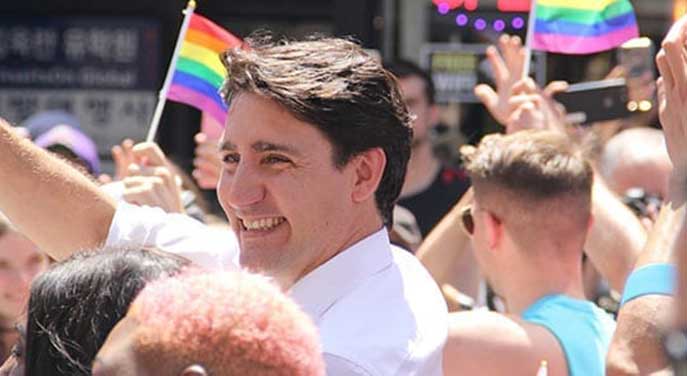 Should the mooted federal election materialize, it’ll be the third time in 50 years that a minority Liberal government took an early trip to the polls.
Should the mooted federal election materialize, it’ll be the third time in 50 years that a minority Liberal government took an early trip to the polls.
So will the result resemble Pierre Trudeau of 1972 and 1974 (a minority followed by a big victory) or Paul Martin of 2004 and 2006 (a minority followed by a loss)?
Trudeau’s Liberals were shaken by the 1972 election. They went into it assuming a comfortable win, only to wind up dropping almost 40 seats and forfeiting their hitherto majority.
The contest was nip-and-tuck at the end. The Liberals finished just two seats ahead of the Conservatives and trailed everywhere except Quebec.
In the election’s immediate aftermath, there was the odd suggestion that it was time for Trudeau to go. But he was having none of it. Instead, he pivoted left.
Ideologically, this was Trudeau’s most palatable option. Strategically, it allowed him to court parliamentary support from the NDP and mend fences with old allies – such as the Toronto Star – that had abandoned him during the campaign.
The political payoff came two years down the road.
After deliberately engineering his government’s defeat in the House of Commons, Trudeau was back on the campaign trail for a July 1974 election that returned the Liberals to majority status. And having supported the government during the minority period, the NDP were rewarded by losing almost half of their seats.
This transformation of Liberal fortunes was an expression of ruthless politics at its most efficient. The same can’t be said for Martin’s travails in 2004 and 2006. Hapless would be a better descriptor.
A former finance minister, Martin was initially seen as a political giant. He was credited as the driving force behind the 1990s taming of Canada’s chronic federal deficits and he was expected to extend Liberal dominance into a second decade. There was even talk of a juggernaut that would win north of 200 parliamentary seats.
It didn’t happen that way.
Ensconced as prime minister in December 2003, Martin was revealed as very different from the anticipated political superman. The nickname “Mr. Dithers” quickly stuck. He was perceived as indecisive, vacillating and politically inept.
And the unfolding taint of the sponsorship scandal didn’t help. While Martin may have had no personal involvement, the Liberal Party certainly did.
Still, a comfortable win was expected in June 2004. The Liberals would, it was believed, score their fourth consecutive majority government. Instead, they lost more than 30 seats and were reduced to a fragile minority.
Almost from the get-go, it was obvious that the parliamentary situation wasn’t sustainable. There’d need to be another round. It came in January 2006.
Again, the Liberals started the campaign comfortably ahead – by as much as 15 points a week after the writ was issued. However, on election night they were down by six and their long run in office was over.
So which is the most likely precedent for 2021?
The first consideration is that the Liberals are Canada’s natural governing party, having been in office for approximately 70 years over the past century. They’re the default government. Their coalition is resilient and, like the United Kingdom Conservatives, their ability to co-opt is remarkable.
When the Liberals lose, it’s usually because of the wear and tear associated with extended periods in power. Think of the 22-year William Lyon Mackenzie King/Louis St. Laurent period between 1935 and 1957. It eventually gave way to six years of governance by Conservative John Diefenbaker, only to be reinstated for another extended Liberal sojourn in 1963.
The 2006 fall also came after a long run that had begun with Jean Chretien’s 1993 victory. Justin Trudeau, in contrast, has only been in office for six years.
Leaders also matter.
The Conservative who beat Martin, Stephen Harper, had many faults. Emphatically non-charismatic, he could be characterized as a micromanaging introvert who was often visibly uncomfortable on camera.
But Harper was seriously smart, politically shrewd and an effective debater. He also had a steely presence that suggested a credible prime minister.
Current Conservative Leader Erin O’Toole has yet to demonstrate the same qualities. Maybe he will after the writ’s dropped.
Bottom line: it’s hard to see a repeat of 2006.
The current Liberal iteration hasn’t been in power long enough for serious fatigue to set in; Justin Trudeau isn’t Martin; and O’Toole is a question mark.
Of the two precedents, 1974 is more likely.
Troy Media columnist Pat Murphy casts a history buff’s eye at the goings-on in our world. Never cynical – well, perhaps a little bit. For interview requests, click here.
The views, opinions and positions expressed by columnists and contributors are the authors’ alone. They do not inherently or expressly reflect the views, opinions and/or positions of our publication.
© Troy Media
Troy Media is an editorial content provider to media outlets and its own hosted community news outlets across Canada.


